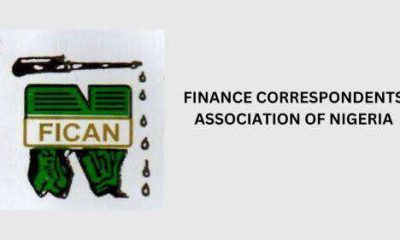Business
Nigerians snub banks over cash withdrawal limits

…as money in circulation hit N4trn
Growing erosion of confidence in the banking sector occasioned by cash withdrawal limits and other disincentives to banking is triggering a surge in the currency in circulation, undermining aggressive monetary tightening by the Central Bank of Nigeria (CBN), aimed at price stability.
According to the CBN’s Money and Credit Data, the currency in circulation surged to an unprecedented N4.05 trillion in July 2024, marking an all-time high.
The figure represents an 11.05 per cent increase since the beginning of the year and a significant 56.17 per cent rise compared to the same period in 2023.
The Nigerian banking public have grappled with difficulty in accessing their deposit in cash since the failed attempt by the immediate past administration of Mohammadu Buhari to redesign the N200, N500 and N1,000 units of the national currency and withdraw the old notes.
The CBN had in furtherance of the launch of the redesigned naira notes on November 23, 2022 and in line with the cashless policy, directed all deposit money banks (DMBs) and other financial institutions (OFIs) in a circular thus:
“The maximum cash withdrawal over the counter (OTC) by individuals and corporate organisations per week shall henceforth be N100, 000 and N500, 000 respectively. Withdrawals above these limits shall attract processing fees of five and 10 percent, respectively
“Third party cheques above N50,000 shall not be eligible for payment over the counter, while extant limits of N10,000 000 on cleaning cheques still subsist. The maximum cash withdrawal per week via Automated Teller Machine (ATM) shall be N100,000 subject to a maximum of N20,000 cash withdrawal per day.
“Only denominations of N200 and below shall be loaded into the ATMs. The maximum cash withdrawal via point of sale (PoS) terminal shall be N20,000 daily.
“In compelling circumstances, not exceeding once a month, where cash withdrawals above the prescribed limits is required for legitimate purposes, such cash withdrawals shall not exceed N5 million and N10 million for individuals and corporate organisations, respectively.”
The circular also directed that monthly returns on cash withdrawal transactions above the specified limits should be rendered to the banking supervision department of the CBN. And that compliance with extant AML/CFT regulations relating to KYC, ongoing customer due diligence and suspicious transaction reporting among others is required in all circumstances,
More than 16 months after inauguration, although some of the provisions of the circular have since been adjusted, the current administration has not brought about meaningful change in the policy, which the then government claimed was to check fraudulent politicians from inducing voters in the last general election.
On the surface, the then CBN said the policy was intended to help deepen the country’s financial inclusion by bridging the gap between the banked and un-banked population of the country.
However, stakeholders believed that poor management of the policy by the then CBN governor, Godwin Emefiele, pushed more Nigerians away from the financial sector; thereby creating financial exclusion that is causing serious trouble for the economy.
While most banks do not allow daily withdrawal from personal accounts beyond N20, 000, Nigerians find it difficult to withdraw cash from Automated Teller Machines (ATMs) across the country. This has forced them to revert to the pre-banking era of keeping their money at home instead of using services provided by the banking sector.
It is even more alarming to note that while money in circulation is increasing, according to data from the CBN, the cash flow no longer passes through the banking sector.
Cash rationing
In December 2023, the CBN suspended charges on large cash deposits above the regulatory limits of N500,000 for individuals and N3,000,000 for corporate accounts to address the growing cash scarcity and empty ATMs across the country.
However, a lot of the cash that left the banking sector during the CBN’s attempt to force a cashless economy policy towards the end of the last administration has not found its way back into the formal banking sector.
The disconnect between the amount of cash in circulation and the actual cash in the banking sector has created a challenge in the banking sector that has forced the banks to resort to cash rationing to meet customers’ demands.
Disturbing trajectory
Analysis of the data revealed that the year began with N3.65 trillion in circulation in January 2024, a stable figure reflecting a typical post-holiday economic environment.
February saw a modest rise to N3.69 trillion, a 1.18% increase from January, while March recorded a more substantial jump to N3.87 trillion, marking a 4.76 per cent month-on-month increase. The upward trend persisted in April, with the currency in circulation hitting N3.92 trillion, up by 1.39 per cent from March, driven by heightened consumer spending during the Easter period.
May and June continued this trend, with the currency in circulation reaching N3.97 trillion in May and peaking at N4.04 trillion in June, representing monthly increases of 1.07 per cent and 2.11 per cent, respectively.
Meanwhile, despite this surge in currency in circulation, Nigeria’s economic growth remains sluggish, with a projected growth rate of 2.9 per cent to 3.1 per cent for 2024, among the slowest in West Africa.
The National Bureau of Statistics (NBS) reported a 3.19 per cent year-on-year growth in real Gross Domestic Product (GDP) for Q2 2024, slightly up from 2.98 per cent in Q1 2024 and 2.51 per cent in Q2 2023.
Inflation, however, continues to be a pressing concern, with the headline inflation rate climbing to 33.40 per cent in July 2024, up from 29.9% in January, despite the CBN raising the Monetary Policy Rate (MPR) to a record 26.75 per cent.
Corroborating the direction of the CBN currency-in-circulation data, a bank customer, Mercy Dike said: “I don’t like to move around with cash, but last year was hell for me and my family and even now no one is sure of what they are doing with cash.
“I won’t be depositing money for now, I have to wait and watch how long this development will stay. You know the saying, once beaten twice shy.”
Disincentives
Speaking on the increasing currency in circulation, a fiscal governance expert and Lead Director at Centre for Social Justice (CSJ), Eze Onyekpere, said it is left for the CBN as the only authorised issuer of the naira to explain the magic of increasing currency in circulation if it is not the authority issuing more currency.
According to Onyekpere, the incentives for Nigerians to put their money in the banking system are not encouraging as the deposit rates are peanuts compared to the lending rates and the inflation rate.
“While the lending rates of different banks are comparable with the inflation rate and still give room for the banks to make a stupendous profit, deposit rates lead to the depreciation of any money kept in the bank”, he said.
“Also, the kind of CBN policy oversight that led to the recent revocation of the license of Heritage Bank cannot be an encouragement for people to put their money in the banks. It is a clarion call for Nigerians, especially, the poor, who do not trust the elite consensus that is heavily weighed against the poor to vote with their feet.
“What was the regulatory agency doing to have allowed the toxic situation in Heritage Bank to build up to the crescendo of total collapse? There are more questions than answers”.
However, Dr. Patrick Modilim, economist and Lead Partner at Modilim & Co, a financial, business and management consulting services provider, told our correspondent that the bulk of the money in circulation is the illegal money the CBN is printing for the politicians.
”The money in the bank is less than 50 percent of the money in circulation. And CBN keeps issuing more money to government to fund their expenses. But they don’t have the money, and that is what is causing this problem of inflation.”, Modilim stated.









